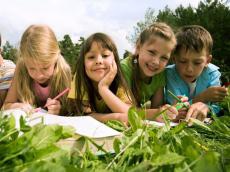|
|
TODAY.AZ / World news
UNESCO unveils new initiatives for Greening Education in classrooms
09 June 2024 [10:46] - TODAY.AZ

By Nazrin Abdul
On World Environment Day, UNESCO introduced new resources aimed at incorporating environmental education into schools and curricula, emphasizing the imperative of empowering youth to actively address the climate crisis, Azernews reports.
According to UNESCO's official website, a recent analysis found that almost half of national curriculum frameworks (47%) surveyed in 2021 didn't address climate disruption, and only 23% of teachers felt adequately equipped to teach climate action. Alarmingly, 70% of surveyed young people lacked an understanding of climate disruption and expressed dissatisfaction with current teaching approaches.
Responding to these findings, Audrey Azoulay, Director-General of UNESCO, has prioritized environmental education support for Member States. UNESCO spearheads the Greening Education Partnership, comprising over 80 countries and more than 1,300 organizations, including UN agencies, civil society groups, youth organizations, and the private sector. This coalition equips countries with essential tools to bolster education's role in combating climate disruption.
While progress has been made in integrating environmental topics into curricula, a new report warns that education has primarily focused on imparting knowledge rather than fostering action. The report emphasizes the necessity of experiential learning to instigate change.
In light of this, UNESCO is introducing two practical tools:
1. Greening Curriculum Guidance: This manual offers a standardized approach to climate education, outlining how countries can infuse environmental topics into curricula across age groups, from kindergarten to adulthood. It advocates for active learning methods and hands-on activities.
2. Green School Quality Standard:Developed in collaboration with UN agencies, civil society, and nations, this standard sets criteria for establishing environmentally conscious schools. It recommends forming green governance committees comprising students, teachers, and parents, promoting teacher training, conducting energy, water, food, and waste audits, and fostering community engagement to address local environmental issues.
URL: http://www.today.az/news/regions/249359.html
 Print version
Print version
Connect with us. Get latest news and updates.
See Also
- 19 December 2024 [09:00]
South Korean military to conduct anti-UAV exercises - 19 December 2024 [08:00]
Honda and Nissan plunge in initial merger talks - 18 December 2024 [23:19]
Seoul sanctions entities aiding Russia-North Korea cooperation - 18 December 2024 [21:23]
Shortlist of Oscar nominees in ten categories announce - 18 December 2024 [20:22]
Global demand for coal reaches record high this year - 18 December 2024 [19:22]
Unusual spiral galaxy of early Universe discovers - 18 December 2024 [09:00]
Montenegro tops among largest number of registrations in national domains - 18 December 2024 [08:00]
China extends visa-free transit for citizens of 54 countries - 17 December 2024 [22:46]
Million years ago bannes: Adele accuses of plagiarizing Brazilian song - 17 December 2024 [21:48]
Argentina manages to get out of economic downturn this year
Most Popular
 UNESCO celebrates 950th anniversary of Diwan Lughat al-Turk
UNESCO celebrates 950th anniversary of Diwan Lughat al-Turk
 More Armenians fly: the crisis of power in Canada
More Armenians fly: the crisis of power in Canada
 Azerbaijani delegation participates in internet governance forum in Riyadh
Azerbaijani delegation participates in internet governance forum in Riyadh
 Rubik Vardanyan surprises his own lawyers
Rubik Vardanyan surprises his own lawyers
 Armenian militant group threatens regional stability aligning with PKK/YPG in new ground
Armenian militant group threatens regional stability aligning with PKK/YPG in new ground
 Azerbaijan's role in COP29 highlights growing global influence, says MEDIA Director
Azerbaijan's role in COP29 highlights growing global influence, says MEDIA Director
 Azerbaijan, Colombia Discuss Cooperation in Various Fields
Azerbaijan, Colombia Discuss Cooperation in Various Fields
